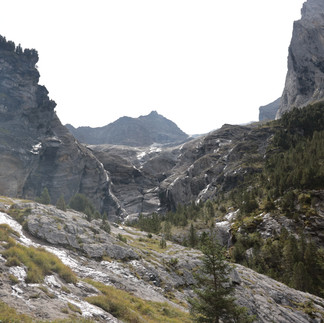5th EthnoKino Bern & Meiringen: Magic in the Mountains
- Eda Tibet
- 28. Okt. 2025
- 6 Min. Lesezeit
Aktualisiert: 29. Okt. 2025

In September 2025, EthnoKino returned for its 5th edition to Switzerland, weaving together cinema, anthropology, and the alchemy of encounter. Under the theme MAGIC, the festival unfolded between Bern’s cozy urban rhythm and Meiringen’s alpine serenity, transforming both into spaces of deep listening and luminous storytelling.
“Magic is not an escape from the real ,it is a return to it.”
EthnoKino 2025 Curatorial Statement

EthnoKino Award of Recognition – Film Reviews

Eskawata Kayawai by Lara Jacoski & Patrick Dequech Belem
Eskawata Kayawai powerfully embodies the spirit of collective healing, ancestral wisdom, and environmental resilience of the Huni Kuin people. Cinematographically stunning, hypnotic, and captivating, the film draws viewers into a sensory world where image, sound, and story merge seamlessly. Though rich in dialogue, its rhythm is beautifully balanced through moments of musical therapy and ritual resonance. Transcending ethnography, Eskawata Kayawai unfolds as a living ceremony ; celebrating the resurgence of indigenous cosmologies and their profound call for planetary balance.
The Tundra Within Me by Sara Margrethe Oskal
This film offers an intimate, poetic journey into the elemental connections between human emotion and the Arctic landscape. Created and performed entirely by Indigenous Sámi artists, The Thundra Within Me radiates authenticity, guided by the ancestral bond between the Sámi people and the reindeer a living force symbolizing endurance, freedom, and belonging. As the reindeer migrates across the tundra, so too unfold the film’s deeper themes of intergenerational tension and gender injustice, revealing the struggles and strength of those navigating change within tradition. With breathtaking visuals and profoundly moving performances, the director and actors transform lived experience into cinematic poetry an ode to resilience, identity, and the pulse of the North.
Made in Paradise by Aniruddha Das
Blending irony, beauty, and social critique, Made in Paradise gracefully immerses viewers in the high-altitude world of the Pashmina and Conghpa herders of Ladakh. Through stunning cinematography and a deeply empathetic gaze, the film reveals the fragile balance between ancestral rhythms and the seductive promises of modern economy. It confronts the contradictions of life in a land often idealized as pure and untouched, yet marked by labor, adaptation, and global entanglements. With quiet power, Made in Paradise unravels how “paradise” is both lived and imagined, offering a profoundly human reflection on belonging, resilience, and illusion in a changing Himalayan world.
Cosmographies by Juan Fransisco Salazar
Cosmographies traverse the boundaries between science, art, and cosmology to invite us into multiple ways of seeing and sensing the universe. Through its kaleidoscopic narrative, the film celebrates relational knowledge systems and cosmopolitical imagination expanding our understanding of how worlds and the space are envisioned and lived.
Ade on a Sunday by Theja Rio
Ade on a Sunday tenderly portrays everyday resilience and joy within a vibrant Nagaland community. With grace and humor, the film captures the intimate rhythms of life, friendship, and self-expression, offering a refreshing and empowering portrayal of Naga youth living in the rural, beyond stereotypes.
Guru Padmasambhava by Aparna Sanyal
This award is presented in recognition of a cinematic work that traverses centuries of Tibetan Buddhist lore to bring to life the profound story of Guru Padmasambhava (Guru Rinpoche). Through evocative storytelling , the film illuminates his pivotal role in establishing the Buddha Dharma in Tibet during the 8th century and founding the Nyingma Lineage, the oldest living school of Tibetan Buddhism. By bridging history, spirituality, and culture, the film honors a timeless legacy that continues to inspire Buddhist practice and wisdom across the Himalayan regions.
Only if the Baby Cries by Shadab Farooq
This award is presented in recognition of a profoundly moving film set in the world’s only deaf-mute village, where silence is both language and life. As Misra Khatoon nears childbirth, the community gathers outside her home, beating drums in a ritual of anticipation, listening for a response that could break or continue the village’s sacred silence. Through its delicate narrative and immersive soundscape, the film transforms silence into a powerful cinematic presence, exploring the boundaries between communication, isolation, and collective identity. It stands as a testament to the art of visual storytelling and to cinema’s capacity to reveal the unspoken depths of human experience.
Ningwasum: Memory by Subash Thebe Limbu
This award is presented in recognition of Ningwasum a groundbreaking Yakthung science fiction work that reimagines the future through an Indigenous lens. Rooted in the Yakthung language, Ningwasum meaning “memory” weaves a visionary narrative where Indigenous Nations hold agency, sovereignty, and technological mastery. Following the journeys of Miksam and Mingsoma, two time-travellers from a future Yakthung Nation, the film traverses timelines to reclaim Indigenous presence and knowledge in shaping the world to come. By blending ancestral wisdom with speculative imagination, Ningwasum expands the horizons of both Indigenous cinema and science fiction, offering a powerful reflection on resilience, identity, and the right to envision self-determined futures.
Aabua Paika Kabu Bageya by Sneha Mundari
This award is presented in recognition of a remarkable film that illuminates a martial art dance form deeply rooted in the traditions of the Munda Indigenous community. More than a medium of performance or entertainment, the artform stands as a living chronicle of history, commemorating the community’s struggles, resistance, and triumphs through rhythm and movement. By intertwining body, memory, and collective identity, the film preserves a powerful cultural legacy , one that continues to inspire resilience and pride across generations. It is an ode to the enduring spirit of Indigenous expression and to the transformative strength of art as a vessel of remembrance and renewal.
A Gathering at the Edge of the Visible
The mist descended upon Meiringen like a slow-moving dream. Pines exhaled rain-scented air, and church bells rippled through the valley. Inside the small, century-old Kino Meiringen, that was to celebrate its 80th birthday with EthnoKino; villagers, travelers, and filmmakers gathered shoulder to shoulder waiting for the screen to glow, for worlds to unfold.
EthnoKino has never been merely a film festival. It is a dialogue between filmmakers and forests, between scholars and shepherds, between spirits and stories. In 2025, that dialogue reached new altitudes.
The festival’s journey from Bern to Meiringen echoed the movement from intellect to intuition, from discourse to devotion. In Bern, vision talks and masterclasses unpacked the ethics of decolonial storytelling, cinematic epistemologies, the pluriverse and the transformative power of visual anthropology.
Vision Talk by Prof.Aashish Xaxa
Masterclass by Prof.Ton Otto
Q&A with Julia Busser
Q&A with Juan Fransisco Salazar
Q&A with Aparna Sanyal & Sneha Mundari
Q&A with Shadab Farooq, Sahib Goni and Theja Rio
Listening to the Mountains:Between Light and Stone
In Meiringen, the conversation softened into the melting and wedding of the glaciers.
Filmmakers from India, Australia, Scandinavia, spoke of glaciers and gods, of disappearing languages and reborn rituals. As night fell, the final credits faded into the white breath of the mountains as if cinema had returned to its first source: light itself. The curatorial vision invited viewers “to dwell in wonder.” But wonder here was not naïve, it was attentive. The mountains became interlocutors, ancient witnesses to human transformation. Each screening felt like a ceremony: a space where the audience didn’t just watch, but listened to silence, to snowfall, to ancestral dreams. The films revealed what modernity often forgets: that magic is not the opposite of reason, but its forgotten twin, a way of knowing through relation, through care, through awe.
Q&A with Aniruddha Das "Made in Paradise"
Vision Talk by Dr.Natalie Ceperley
Echoes and Afterlight
By the end of the weekend, autumn light spilled across Meiringen’s peaks. Visitors and artists began their descent carrying with them stories like small stones of remembrance.
EthnoKino 2025 will be remembered not only for its films but for its presence, the way it invited listening as an act of kinship. It was a cinema of reciprocity, of quiet transformations.
A festival that reminded us that to look ,truly look is already beginning to change.
“Perhaps cinema was always meant to be a mountain, a place where worlds meet, where we ascend together toward meaning.”
Gallery: Light and Stone
Acknowledgements
The 5th EthnoKino Film Festival Bern and Meiringen was curated by Eda Elif Tibet and Aashish Xaxa and Hana Gübler, in collaboration with the worldwide curators of EthnoKino Collective and Kino Meiringen as well as Cinematte Bern. The festival was made possible through the support of Swiss Leading House for South Asia and dedicated partners across Switzerland and beyond. Special thanks to all filmmakers, speakers, volunteers, and audiences who made these days an act of shared wonder keeping cinema alive as a bridge between worlds.
Meiringen Photographs by E.E.Tibet. Bern Videos by Senol Sen, Meiringen videos by Sahib Goni.






























































































Kommentare